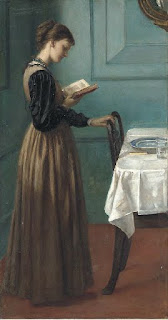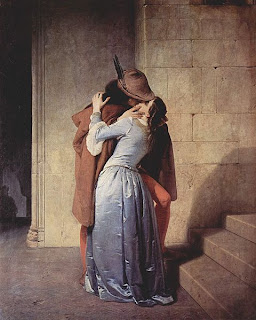 What if you were asked What is a Romance Novel by someone who doesn’t read romance novels? A relative asked me this question. She’s an educated, well-read person, so I wanted to give her as good an answer as I could.
What if you were asked What is a Romance Novel by someone who doesn’t read romance novels? A relative asked me this question. She’s an educated, well-read person, so I wanted to give her as good an answer as I could.
Romance novels can be incredibly diverse, encompassing history (like me), suspense, elements of women’s fiction, comedy, paranormal, inspirational – you name it. They can also vary by tone from light “romps” to darkly emotional. But what they all have in common is that they are telling the story of a romance. The book is about the romance. The story is the romance–How two people fall in love and find their happily ever after. The happily ever after is essential. A romance is not about doomed romance or tragic romance. It is a celebration of successful romance.
What I mean is, an historical romance is not about the historical events; it is about how two people manage to find love together. Historical events might impact on them, but the story is about their romance. Same with Romantic Suspense- the story is not about—say—a murder mystery. It is about how two people find love together while impacted in some way by a murder mystery.
Because of the focus on two people falling in love, romance novels are basically character focused. And because nobody would read a book about a romance that goes smoothly from first meeting to the wedding day, there has to be conflict. There must be forces driving the couple apart as well as the attraction between them that make them fall in love.
 Romance novels today mostly have strong heroes and heroines. Gone are the victim heroines who must passively be rescued by the hero. Heroines need to act on their own behalf just as much as the hero. Characters must be three dimensional and must act in sensible ways or in ways that are understandably motivated.
Romance novels today mostly have strong heroes and heroines. Gone are the victim heroines who must passively be rescued by the hero. Heroines need to act on their own behalf just as much as the hero. Characters must be three dimensional and must act in sensible ways or in ways that are understandably motivated.
There are some “mostlys” we see in romance novels:
The hero and heroine are mostly together for most of the book
The plot is mostly fast-paced with a major turning point in the middle of the book and a “Black Moment” toward the end.
Okay….so, how did I do?

Yes, I voted and I love your cover — Paul Marron!
Thanks for the great links on romance novels. I will be taking a look at these later today.
I’m so glad you found the links helpful, Artemis. And thank you for voting!
Wow, Diane! I’m impressed. I think you answered it quite thoroughly. If they’re interested in reading it, and not simply looking at it academically, I’d recommend they try a variety of books. Reading one and condemning the entire genre is like eating a burnt cookie and deciding all cookies are horrible. And simply because you didn’t like one author, doesn’t mean you won’t like another in the same genre. I have an incredibly diverse personal library. I’m more interested in the author’s approach than the actual genre, though I do have decided preferences.
Brava, Diane! I am SO referring folks to this post.
Gosh. Thanks Judy and Jane George. I wrote this off the top of my head.
Judy, good point about reading several romances. And I love the cookie analogy. Must borrow that sometime
Cookie analogy is perfect. I pretty much feel that way about everything (books, ethnic food, movies, etc.). There are no genres or types of food that I dislike in their entirety. And often, my friends who say they don’t read romance actually do, they just read what I call stealth romance (Bridget Jones’s Diary, Twilight, Watermelon, Bad Heir Day, Outlander, etc.).
Great post!
I am a romance writer– unpub’d, followed Jane George’s recommendation. I’m so glad you linked to RWA as a starting point; there are so many writers out there who don’t know where to turn to for support. And so many of us writers are readers first, so it makes sense that they’ll find your information here. Don’t forget that RWA has local chapters all over the U.S., so you can find others, possibly in your neighborhood.
And yes, there are at least a thousand subgenres out there, but I do like what Isobel Carr noted as ‘stealth’ romance. Good call!
Thanks for your definition.
Lovely blogsite too.
Wow, Diane. What a wonderful way to describe romance and it actually makes me think that perhaps my high concept chick lit novel is maybe a romance novel instead. I guess it all depends on how you look at it 🙂
Speaking of romance books, here’s an interesting article: http://www.theglobeandmail.com/news/arts/books/romancing-the-tablet-how-harlequin-is-revolutionizing-the-e-book-market/article2021256/?utm_medium=feed&utm_source=feedburner&utm_campaign=Feed%3A+TheGlobeAndMail-Entertainment+%28The+Globe+and+Mail+-+Arts+News%29
Also I used to snub my nose at romance. I thought I was above the sex and the bodice ripping, but a friend had me read a Regency and then I learned the error of my ways. Now I am trying to educate my friends as well and introduce them to this great genre.
Isobel, I love that term “stealth romance.” How very true that many readers are reading romance without knowing it! Heck, they can read Jane Austen!
Pamela, welcome to the Riskies!!! I hope you will come back and visit us often. I love that you are cheerleading RWA. I really credit RWA and its chapters for my success in publishing. Everything I’ve learned about writing has some connection to RWA.
Artie Mesia, you are not alone in snubbing romance books. Most of what is written about the romance genre has been disparaging, and if someone does eat a “burnt cookie” it does tend to generalize.
Thank you for including the article. Even though it sorta made fun of romance, it also suggested that we might have the last laugh after all!
I think of Chick Lit as a romance subgenre. Or it could also be in the “Romantic Elements” category: stories with a satisfying romance in them that are really “about” something else. In any event, Romance has embraced Chic Lit along with other not-quite-romance hybrids. Yay for that!
Fabulous post, O Divine One! And some great links as well. I am printing all of this so I will be well armed the next time someone calls my writing of historical romance a “frivolous hobby!”
Already voted for the covers.
I think your answer summed up what a romance is very well. I like your “mostly” list. I can think of a few, very few, that didn’t follow those steps, but for the most part they could act as the outline of how to write a romance story. You have done aspiring authors a service providing the links you did. It is often difficult to know where to start, and if you are new to the “profession,” you don’t know where to look.
Of course, I voted for Paul Marron! 🙂
I look at romances in general as:
– boy meets girl
– boy loses girl (or vice versa)
– boy wins girl back (or vice versa)
There can be vampires, zombies, assassins, apocalypse, whatever, but there has to be a HEA! I didn’t read romances until later in life (those Harlequins left by former college dorm residents didn’t count). I did disparage romances in my youth but it was more because my friends and cousins read them while I was reading mysteries and depressing fiction like “The Catcher in the Rye”, “Long Day’s Journey into Night”, “The Glass Menagerie”, etc. I guess I really wasn’t into HEAs back then.
librarypat, thank you for the nice words about the blog.I was surprised how easy it was to write and even easy to find the links, but I remember those days when I was hungry for information and didn’t know where to look. If I steer even one person in a helpful direction, I’m happy!
Sheree,
I’m sure you weren’t the only young person who preferred reading “depressing” fiction!! How many of us endured our angsty years?
Thanks for voting for Paul Marron!!!